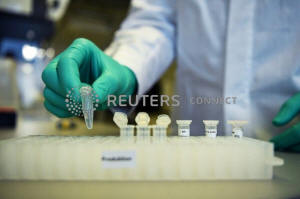Germany tries to halt U.S. interest in firm working on coronavirus
vaccine
 Send a link to a friend
Send a link to a friend
 [March 16, 2020]
By Paul Carrel and Andreas Rinke [March 16, 2020]
By Paul Carrel and Andreas Rinke
BERLIN (Reuters) - Berlin is trying to stop
Washington from persuading a German company seeking a coronavirus
vaccine to move its research to the United States, prompting German
politicians to insist no country should have a monopoly on any future
vaccine.
German government sources told Reuters on Sunday that the U.S.
administration was looking into how it could gain access to a potential
vaccine being developed by a German firm, CureVac.
Earlier, the Welt am Sonntag German newspaper reported that U.S.
President Donald Trump had offered funds to lure CureVac to the United
States, and the German government was making counter-offers to tempt it
to stay.
Responding to the report, the U.S. ambassador to Germany, Richard
Grenell, wrote on Twitter: "The Welt story was wrong."
A U.S. official said: "This story is wildly overplayed ... We will
continue to talk to any company that claims to be able to help. And any
solution found would be shared with the world."

A German Health Ministry spokeswoman, confirming a quote in the
newspaper, said: "The German government is very interested in ensuring
that vaccines and active substances against the new coronavirus are also
developed in Germany and Europe."
"In this regard, the government is in intensive exchange with the
company CureVac," she added.
Welt am Sonntag quoted an unidentified German government source as
saying Trump was trying to secure the scientists' work exclusively, and
would do anything to get a vaccine for the United States, "but only for
the United States."
German Interior Minister Horst Seehofer told a news conference that the
government's coronavirus crisis committee would discuss the CureVac case
on Monday.
CureVac issued a statement on Sunday, in which it said: "The company
rejects current rumors of an acquisition".
CureVac's main investor Dietmar Hopp said he was not selling and wanted
CureVac to develop a coronavirus vaccine to "help people not just
regionally but in solidarity across the world."
"I would be glad if this could be achieved through my long-term
investments out of Germany," he added.
A German Economy Ministry spokeswoman said Berlin "has a great interest"
in producing vaccines in Germany and Europe.
[to top of second column]
|

Employee Philipp Hoffmann, of German biopharmaceutical company
CureVac, demonstrates research workflow on a vaccine for the
coronavirus (COVID-19) disease at a laboratory in Tuebingen,
Germany, March 12, 2020. Picture taken on March 12, 2020.
REUTERS/Andreas Gebert

She cited Germany's foreign trade law, under which Berlin can
examine takeover bids from non-EU, so-called third countries "if
national or European security interests are at stake".
EXPERIMENTAL VACCINE
Florian von der Muelbe, CureVac's chief production officer and
co-founder, told Reuters last week the company had started with a
multitude of coronavirus vaccine candidates and was now selecting
the two best to go into clinical trials.
The privately-held company based in Tuebingen, Germany hopes to have
an experimental vaccine ready by June or July to then seek the
go-ahead from regulators for testing on humans.
On its website, CureVac said CEO Daniel Menichella early this month
met Trump, Vice President Mike Pence, members of the White House
Coronavirus Task Force and senior representatives of pharmaceutical
and biotech companies to discuss a vaccine.
CureVac in 2015 and 2018 secured financial backing for development
projects from its investor the Bill & Melinda Gates Foundation,
working on shots to prevent malaria and influenza.
In the field of so-called mRNA therapeutics, CureVac competes with
U.S. biotech firm Moderna and German rival BioNTech, which Pfizer <PFE.N>
has identified as a potential collaboration partner.
Drugs based on mRNA provide a type of genetic blueprint that can be
injected into the body to instruct cells to produce the desired
therapeutic proteins. That contrasts with the conventional approach
of making these proteins in labs and bio-reactors.

In the case of vaccines, the mRNA prompts body cells to produce
so-called antigens, the tell-tale molecules on the surface of
viruses, that spur the immune system into action.
Companies working on other coronavirus-vaccine approaches include
Johnson & Johnson <JNJ.N> and INOVIO Pharmaceuticals, Inc. <INO.O>.
(Additional reporting by Ludwig Burger and Patricia Weiss in
Frankfurt; Editing by Alexandra Hudson and Alexander Smith)
[© 2020 Thomson Reuters. All rights
reserved.] Copyright 2020 Reuters. All rights reserved. This material may not be published,
broadcast, rewritten or redistributed.
Thompson Reuters is solely responsible for this content. |